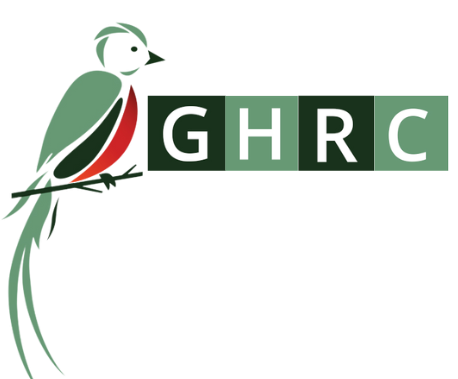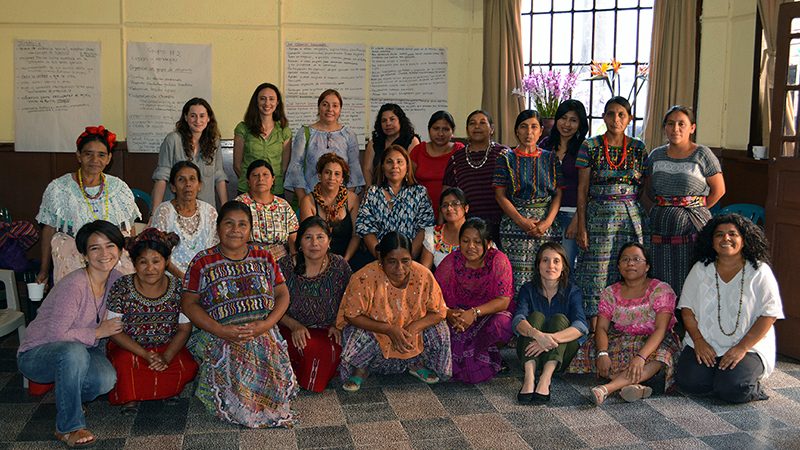By Kathryn Johnson, GHRC Assistant Director
On April 1st, Makrina stood at the front of a packed room at the University of Massachusetts, Amherst, and recounted her family’s fight for true democracy in her native Guatemala despite decades of devastating violence.
She described growing up with the teachings of her father, Florentin, who combined a deep Christian faith with revolutionary ideas to help the community organize to fight poverty, discrimination and inequality. She explained how he was nearly killed, and how she and her mother narrowly escaped kidnappings – events that forced the family to flee to Mexico in 1983.
The University of Massachusetts event marked the first stop on an exhausting — but incredibly inspiring — two-week, five-state speaking tour.
At each stop, Makrina explained how her family had planned to meet at the border between Guatemala and Mexico, but her brother never arrived. Soon after, they learned that he had been kidnapped by Guatemala’s armed forces. While her parents and siblings remained in Mexico, Makrina – with the help of the Sanctuary Movement – sought refuge in the United States. She swore to expose the crimes committed by the Guatemalan government against her countrymen and women, including her brother.
Makrina explained that when she lived in the New York in the 1980s, the US refused to recognize her and thousands of others from Guatemala and El Salvador as political refugees. Instead, they claimed that they were economic migrants and went to great lengths to capture and deport them. She lived for years in the bell tower of Riverside Church and spoke out about the massive violations going on in her country, asking US citizens to push for an end to US support to the Guatemalan military.
In Massachusetts, Rhode Island, and New York, Makrina also spoke to immigrant groups, describing her work with the Guatemalan National Revolutionary Unity Party (URNG) after the signing of the Peace Accords paved the way for her family to return to Guatemala. In her home town of Santa Lucia Cotzumalguapa, in the department of Escuintla, new schools were built, health promoters here hired, communities were formally organized, and women were encouraged to take leadership positions within those organizations. Then, in 2003, the URNG Party won the municipal elections, angering local elites, and provoking renewed threats against her family.
Makrina’s father was murdered in 2004 and her family was forced to flee their home once again. The Public Prosecutor’s office never questioned the man who had sent the threats her father received. Makrina eventually brought her father’s case to the Inter-American Court of Human Rights, and is awaiting a verdict.
Audiences also learned about the the special forms of persecution that women human rights defenders face, such as sexual threats, threats against their children, and pressure from their own families.
Nonetheless, Makrina said, the struggle for justice for crimes against loved ones brings a measure of dignity and satisfaction to survivors. Twenty-eight of the families whose relatives appear in a Guatemalan logbook called the “Military Diary” have come together to prove that Guatemala had a state policy of kidnapping and disappearing those considered internal enemies. The Inter-American Court agreed with the families, and in 2012 ordered the Guatemalan Government to investigate the case.
Makrina explained that now these families are fighting to bring their case to a Guatemalan Court, but that it’s an uphill battle that brings immense risk to the families. She called on all who heard her speak to take action to help the struggle for justice.
About The Truth and Justice Association (AVEJA)
After returning to Guatemala, Makrina helped legally found an organization called the Truth and Justice Association (known by its Spanish acronym AVEJA) – a group composed of relatives of those who appear in the Military Diary.
As one of AVEJA’s leaders, Makrina helped organize a press conference on May 20th, 2014 to formally announce the new group, as well as to honor the 15-year anniversary of the discovery of the Military Diary. The organization is active both in pursuing justice through the national and international court systems, and in carrying out actions related to historic memory. With its new legal status, AVEJA was also able to participate as a plaintiff in a national case which has come to be known in Guatemala as the “Military Diary case.”

